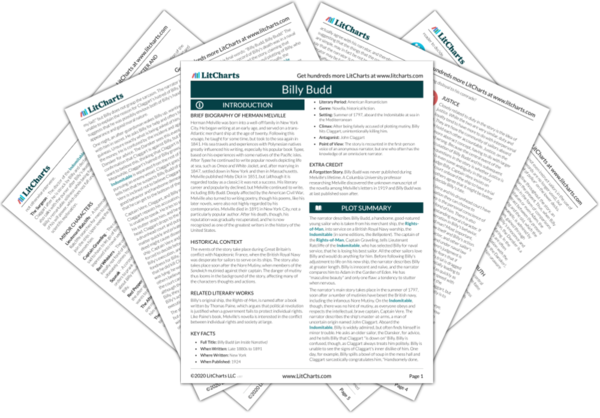The clash between false rumor and truth is central to the plot of Billy Budd. The story turns on the false rumors that Claggart makes up and reports to Captain Vere, while Vere must decide between the truthfulness of Claggart's and Billy's stories. The distinction between truth and rumor is thus a matter of life or death for both Claggart and Billy. Moreover, the very story of Billy's tragic death is caught between these two categories. The naval chronicle that reports his death has authority and supposedly preserves the truth of the situation for posterity. However, the reader knows that the naval chronicle, which relates Claggart's version of the story, actually ends up reporting nothing more than a false rumor. By contrast, the sailors' ballad about Billy Budd, which sympathetically describes his final moments, can be seen as closer to the truth, even though such seafaring songs are usually less truthful and trustworthy than media like the naval chronicle.
Even Melville's story itself plays with this tension between true and false stories. The narrator constantly draws attention to himself as telling the story, referring to himself with personal pronouns and addressing the reader directly. He calls attention to his frequent digressions from the main narrative of his story, as well as to his ability to fabricate and make things up. He says it would be easy, for example, to make up an incident explaining the malice Claggart had toward Billy Budd, though there was no such incident. In these moments, the narrator insists on his trustworthiness, but this actually has the effect of making the reader skeptical and more aware of the narrator's ability to stray from the truth throughout the tale. Moreover, he acknowledges the limits of his knowledge as a narrator, when he admits that he can only imagine how Captain Vere informed Billy of his death sentence. The entire story of Billy Budd thus comes to resemble the other stories told within it. Like other sailors' yarns, it hangs somewhere in the border between rumor and truth.
Further, the narrator asserts a number of times that his tale of Billy Budd is a true story, an actual event. This assertion has the affect of separating the narrator from Melville, the author. Melville wrote Billy Budd, a fiction. But the narrator is telling a true story about a man named Billy Budd. The narrator, then, is a part of the world created by Melville, and the narrator exists at the same level as Billy, Claggart, Vere, and all the other characters. The narrator, then, is just as fallible as those other characters. And just as people may disagree about what happened even though they witnessed the same events, the narrator's story of Billy Budd should be seen not necessarily as the version of what happened, but as a version.
Storytelling, Rumor, and Truth ThemeTracker

Storytelling, Rumor, and Truth Quotes in Billy Budd
Such sanctioned irregularities...lend color to something for the truth whereof I do not vouch, and hence have some scruple in stating; something I remember having seen in print, though the book I cannot recall... In the case of a warship short of hands whose speedy sailing was imperative, the deficient quota, in lack of any other way of making it good, would be eked out by drafts culled directly from the jails.
But the less credence was to be given to the gun-deck talk touching Claggart, seeing that no man holding his office in a man-of-war can ever hope to be popular with the crew.
But the incident confirmed to him certain telltale reports purveyed to his ear by "Squeak," one of his more cunning corporals... the corporal, having naturally enough concluded that his master could have no love for the sailor, made it his business, faithful understrapper that he was, to foment the ill blood by perverting to his chief certain innocent frolics of the good-natured foretopman, besides inventing for his mouth sundry contumelious epithets he claimed to have overheard him let fall.
The same, your honor; but, for all his youth and good looks, a deep one. Not for nothing does he insinuate himself into the good will of his shipmates, since at the least all hands will at a pinch say a good word for him at all hazards. ...It is even masked by that sort of good-humored air that at heart he resents his impressment. You have but noted his fair cheek. A man trap may be under his ruddy-tipped daisies.
The symmetry of form attainable in pure fiction cannot so readily be achieved in a narration essentially having less to do with fable than with fact. Truth uncompromisingly told will always have its ragged edges; hence the conclusion of such a narration is apt to be less finished than an architectural finial.
















